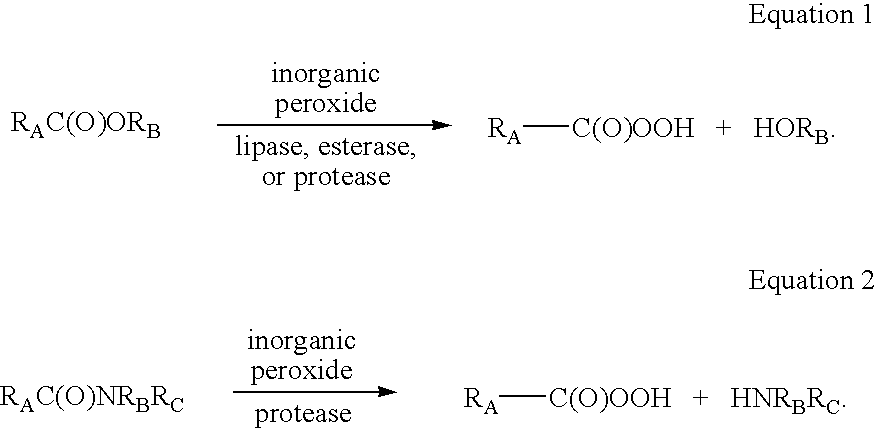Enzymatic production of peracids using perhydrolytic enzymes
a technology of perhydrolytic enzymes and peracids, which is applied in the field of enzyme catalysis of peracids, can solve the problems of catalysts not producing and accumulating peracids at a sufficiently high concentration to be effective, and the concentration of peracid in the solution decreases
- Summary
- Abstract
- Description
- Claims
- Application Information
AI Technical Summary
Benefits of technology
Problems solved by technology
Method used
Image
Examples
example 1
Lipase-catalyzed Perhydrolysis of Triacetin at pH 6.5
[0130] Into a 4-mL glass vial with stir bar was added 1 mg enzyme (ICR 101-117, BioCatalytics, Pasadena, Calif.) in 0.050 mL of 50 mM potassium phosphate buffer (pH 6.5), 0.900 mL of 278 mM triacetin in 50 mM potassium phosphate buffer (pH 6.5, 250 mM final triacetin concentration), and 0.052 mL 30% hydrogen peroxide (500 mM final concentration). After stirring for 5 or 30 minutes at 22° C., a 0.250 mL sample was filtered using a 30,000 Nominal Molecular Weight Limit (NMWL) filter (Millipore UltraFree-MC, Millipore Corp., Billerica, Mass.) centrifuged for 2 minute at 12,000 RPM. A portion of the filtered reaction samples was diluted 1:10 with dd water and analyzed for hydrogen peroxide, and the remaining portion of the sample was directly analyzed for peracid using the HPLC assay method (Table 1).
TABLE 1Lipase-catalyzed Perhydrolysis of 250 mM Triacetin at pH 6.5.peracetic acidperacetic acidenzymeenzyme source(ppm), 5 min(ppm),...
example 2
Lipase-catalyzed Perhydrolysis of Triacetin at pH 4.0
[0131] Into a 4-mL glass vial with stir bar was added 1 mg enzyme (ICR 101-117, BioCatalytics, Pasadena, Calif.) in 0.050 mL of 50 mM sodium acetate / acetic acid buffer (pH 4.0), 0.900 mL of 278 mM triacetin in 50 mM sodium acetate / acetic acid buffer (pH 4.0, 250 mM final triacetin concentration), and 0.052 mL 30% hydrogen peroxide (500 mM final concentration). After stirring for 5 or 30 minutes at 22° C., a 0.250 mL sample was filtered using a 30,000 NMWL filter (Millipore UltraFree-MC) centrifuged for 2 minute at 12,000 RPM. A portion of the filtered reaction samples was diluted 1:10 with dd water and analyzed for hydrogen peroxide, and the remaining portion of the sample was directly analyzed for peracid using the HPLC assay method (Table 2).
TABLE 2Lipase-catalyzed Perhydrolysis of 250 mM Triacetin at pH 4.0.peracetic acidperacetic acidenzymeenzyme source(ppm), 5 min(ppm), 30 minno enzyme109.6ICR-101Aspergillus sp.238555ICR-1...
example 3
Lipase-catalyzed Perhydrolysis of Triacetin at pH 4.0
[0132] Into a 4-mL glass vial with stir bar was added 2 mg enzyme (lipase ICR 101 or ICR 110, BioCatalytics, Pasadena, Calif.) and 1.0 mL of 50 mM sodium acetate / acetic acid buffer (pH 4.0) containing from 250 mM or 500 mM triacetin and 500 mM or 2500 mM hydrogen peroxide). After stirring for 5 or 30 minutes at 23° C., a 0.250 mL sample was filtered using a 30,000 NMWL filter (Millipore UltraFree-MC) centrifuged for 2 minute at 12,000 RPM. A portion of the filtered reaction sample was diluted 1:20 with dd water and analyzed for peracid using the HPLC assay method (Table 3).
TABLE 3Lipase-catalyzed Perhydrolysis of 250 mM or 500 mM Triacetinat pH 4.0.triacetinH2O2peracetic acidperacetic acidenzyme(mM)(mM)(ppm), 5 min(ppm), 30 minno enzyme2505001010ICR-1012505004611030ICR-110250500498568no enzyme25025001715ICR-10125025006561158ICR-110250250015702880no enzyme500250010207ICR-10150025006121109ICR-110500250018603755
PUM
| Property | Measurement | Unit |
|---|---|---|
| pH | aaaaa | aaaaa |
| temperature | aaaaa | aaaaa |
| concentration | aaaaa | aaaaa |
Abstract
Description
Claims
Application Information
 Login to View More
Login to View More - R&D
- Intellectual Property
- Life Sciences
- Materials
- Tech Scout
- Unparalleled Data Quality
- Higher Quality Content
- 60% Fewer Hallucinations
Browse by: Latest US Patents, China's latest patents, Technical Efficacy Thesaurus, Application Domain, Technology Topic, Popular Technical Reports.
© 2025 PatSnap. All rights reserved.Legal|Privacy policy|Modern Slavery Act Transparency Statement|Sitemap|About US| Contact US: help@patsnap.com



